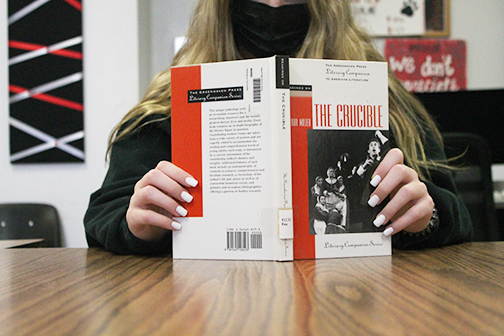Witch hunting
What The Crucible can teach us about America today

Where does the story take you? • By transporting readers to 1692 Salem, The Crucible challenges readers to see the modern world through the eyes of the past.
Arthur Miller’s 1953 play The Crucible has become an American classic. On the surface, it is a story about The Salem Witch Trials. A young girl and her friends are caught dancing in the woods, and when talk of witchcraft starts, she capitalizes off of the fear and sparks a hysteria that would change her small community forever.
It’s relatively common knowledge that this story was an allegory for the red scare and the HUAC trials that were going on when Miller wrote the play.
At the time, America was very scared of Communism taking over, so a committee was formed to identify Communists in the government. This committee started to convict people that they suspected may hold that ideology, despite usually having no real evidence. This fear of both Communists and the consequences of being suspected to be one caused tensions to grow in communities all over the country. People no longer trusted their neighbors and friends. Many people were willing to accuse anyone to protect themselves.
Miller creates a parallel between these two points in history. He shows that even though close to three hundred years had passed between the Salem Witch Trials and the HUAC trials, people hadn’t really changed.
The Crucible is about more than witches and court rooms. The Crucible is about what happens when people let fear and ignorance overshadow truth and justice, a sentiment that is becoming more and more important every day in America.
Big things are happening every day in the U.S….protests, quarantine, and an upcoming election, just to name a few.
America is on the edge of major change, but nobody really knows what that’s going to look like. All of the uncertainty is causing division in our country, and every day we get closer to the election, the tension grows.
A similar tension was growing in 1692 and in 1953. In Salem, it was the potential of witchcraft that caused this, and many years later it was the threat of communism. The common thread throughout all three of these points in history is a looming, scary, and mysterious threat to society, and the fear of the unknown.
America is in act one of The Crucible. We are right on the verge of something. Now it’s up to the people to decide if that something will be positive or negative. It’s been shown time and time again that fear clouds our judgement and can lead society down a bad path, so it’s the responsibility of the American public to hold on tightly to reason and morality.
As a society it’s important to see the power of unity.
America will only truly grow if everyone chooses to grow with it, which means, even when it’s hard, trying to accept each other.
Hate has to be met with love, and in stressful times, it’s so crucial that the inherent value of human life is not forgotten.
At the beginning of The Crucible, Reverend Hale, a pastor in the area known for his exorcisms and witch hunting, comes to Salem and claims that there are, in fact, witches there.
However, by the end of the play he comes around and tries to fight the court because even though he believes in the threat of witchcraft, he sees that the value of human life has been forgotten by the community.
Hale states that, “Life is God’s most precious gift; no principle, however glorious, may justify the taking of it.”
Not everyone’s literal lives are on the line right now, but our society needs to be slow to attack the livelihoods of others as well.
The Crucible is a compelling, insightful, and deeply moving story. The takeaway of that story was not only important during the red scare. It’s important now as well.
As a country, we can choose to learn from our past mistakes and move forward. Question what society pressures you to believe, be slow to anger, and hold onto truth. That is how America can become greater than its current circumstances.

